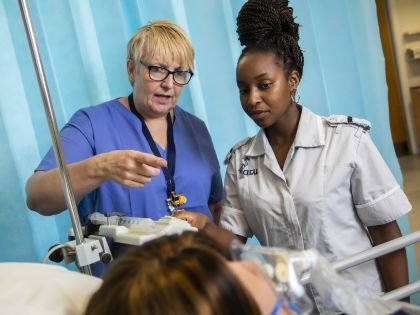
Nursing
Take the first step toward a rewarding career in nursing with our Nursing Foundation Pathway.
Key Information
Our foundation year will equip you with the vital skills to succeed on an NMC-accredited nursing degree at Anglia Ruskin University (ARU).
Key information
Undergraduate course
Duration
- Two Trimesters
Intakes
- September (UK and International Students)
- January (International Students only)
- March (UK Students only)
Location
- Cambridge
Chelmsford
Overview
Begin your journey into nursing with our foundation programme, designed to prepare you academically and professionally for entry into a BSc (Hons) Nursing degree at ARU. Our foundation year offers a supportive route for those without traditional qualifications but with relevant experience or potential.
Join ARU, the largest provider of nursing and healthcare students in England, ranked #1 in the East of England for graduate employment in health and social work (HESA Graduate Outcomes Survey 2024). Progress to our NMC-accredited BSc (Hons) Nursing degree and gain real-world experience through clinical placements with top NHS Trusts, supported by expert mentors.
Train in cutting-edge skills labs, using our mock wards and specialised equipment. Build your confidence and prepare for a career that truly matters.
Nursing at ARU

Progression Degrees
Upon successful completion of the foundation course, you can progress to one of the following ARU degrees:
For Home and International Students
For Home Students only
Course Content
Psychology
Human behaviour, emotions and mental processes all play a role in health and wellbeing. In this module, you’ll explore psychological theories, patterns of behaviour, and common mental health conditions.
Biology – Physiology
A strong understanding of the human body is the foundation of effective healthcare. In this module, you’ll learn about anatomy, organ systems, genetic inheritance and biological regulation.
Health and Wellbeing
Good health is shaped by more than medical care, it’s influenced by education, income, housing and wider social factors. In this module, you’ll explore these determinants of health, and how to promote wellbeing for individuals, groups and communities.
Learning to Learn
Transitioning into higher education can be exciting but challenging. This module will help you develop the study skills, academic writing techniques, and digital literacy you’ll need for success.
Core Maths
Strong numeracy skills are vital in healthcare, from calculating medication dosages to interpreting patient data. This module will help you build confidence in arithmetic, algebra, statistics and data handling, with a focus on applying these skills in real-world health and care contexts.
Preparing for a Career in Care
Working in health and social care is about more than clinical skills—it’s about understanding people, systems and values. This module introduces the structure of the NHS, the roles of professional bodies such as the NMC, and the principles of effective communication.
Embracing Diversity in Patient Care
Treating people with fairness, respect and dignity is at the heart of effective, compassionate care. In this module, you’ll explore the principles of equality, diversity and inclusion, and how to recognise and challenge discrimination in practice.
Entry Requirements
5 GCSEs at grade 3 or above (or grade E if taken before 2017), plus one of the following:
- Two years of post-GCSE study
- Minimum two years of employment (CV and reference required)
- A combination of study and work totalling at least two years
Please see our Academic and English Language requirements listed by country
Progression Requirements
The Nursing Foundation Pathway is designed to help you take the next step into an NMC-accredited BSc (Hons) Nursing degree. When you finish your foundation year, you’ll be ready to move forward if you:
- Pass and complete all foundation year modules
- Successfully pass a faculty interview for your chosen specialism
- Obtain a clear Disclosure and Barring Service (DBS) check
- Meet Occupational Health clearance requirements
Note: Only after meeting these conditions can you enrol in the accredited nursing degree.
Important additional notes
- Entry requirements are a guide; our decision will be based on your overall suitability for the course as well.
- Other equivalent qualifications may be accepted, contact info@arucollege.com for details.
- See our International and UK course matrix for entry points, intake dates, and study locations.
Apply for January 2026
Nursing is more than a profession, it’s a chance to make a meaningful impact, one patient at a time.
Apply Now